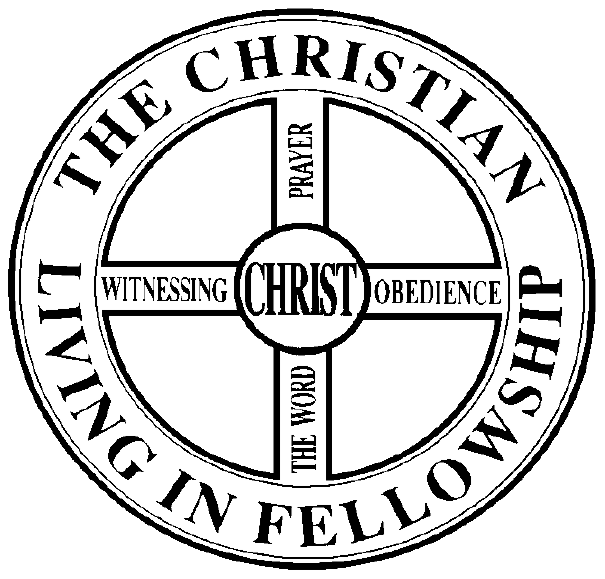
Witnessing: Your Testimony
Obedience isn't easy, especially since the Lord's ways and thoughts are not ours (Isaiah 55:8-9). But I trust that as you've made special effort to trust the Lord and follow in His ways, He has shown Himself to you in new and powerful ways (John 14:21).

You'll remember we've been working our way through and around the Wheel Illustration of a growing Christian life. The final spoke of that illustration, and one that can provide impetus in unique ways, is Witnessing. The founder of Training Evangelistic Leadership, Roy Robertson, was taught—and passed on to those he discipled—that we witness in two ways: By life and by lip.
For the Christian, both ways are vital, but Paul indicates in his letter to the Philippians that most important of all is a verbal testimony (Philippians 1:15-18). But who among us would want to proclaim the message of Heaven, yet live a life of Hell? Our personal integrity—and the Spirit of God!—demands that we live in step with the Lord who saved us. We also know that every Believer will stand before the Judgment seat of Christ "so that each one may receive what is due for what he has done in the body, whether good or evil" (2 Corinthians 5:10, ESV) Hence, the last two posts on obedience (post 1 and post 2). So then, through Obedience our life shines the light of Christ to those around us, and God willing, prompts them to ask us for an explanation of that light (1 Peter 3:15-16, above).
There are two ways to answer: Our personal testimony and a clear Gospel message.
Your Personal Testimony
There are different kinds of personal testimonies, but all are intended to explain to another how God has worked in our lives. Testimonies about God's faithfulness in response to our obedience—or His mercy in spite of our disobedience!—can equally inspire others to take seriously the claims and commands of Christ for our lives. But the kind of testimony we're most concerned with here is how God saved you: Your Salvation Testimony. If you've already prepared a personal testimony, then you're ahead of the game. Have you brushed up on it? Are you ready to share it with someone else? If not, please consider this post as a gentle reminder to make yourself ready. If you've never prepared your testimony, I hope these few pointers might help.
A salvation testimony usually includes three parts: Before Christ, How I Came to Christ and After Christ. We normally encourage disciples to prepare to share their testimony in about five minutes. That means you don't need to go into a whole lot of detail; however, you might want to prepare first a ten-minute testimony, then pick out the highlights and whittle it down to five. Or you can start with the basics and prepare the five-minute version, then expand it for a ten-minute presentation. Generally speaking, when talking casually with others, you would want to draw on your five-minute version. But if offered a chance to share in a group, you would want to use your ten-minute version as a guide. As a guideline for a five-minute testimony, you would want to spend no more than two minutes on your life before Christ and no more than one minute on your life after Christ. The remaining two minutes (or more) should be spent on how you came to Christ. For a ten-minute testimony, fully half of it should be how you came to Christ, the remaining five minutes split up between your life before and after.
Look over Paul's testimony before King Agrippa for a great Biblical example. Make note of how Paul describes himself before he became a Christian (both good and bad), then how he came to believe in Jesus, and finally how his life changed after trusting in Christ.
For your own testimony, consider what your life was like before you became a Christian. Was there some problem or question that drove you to search for answers, eventually leading you to evaluate the claims of Christ? Were there ways you tried to solve the problem or answer the question that failed to satisfy or succeed? Try to focus in on just one issue, one struggle you had, that was solved or satisfied in Jesus. It will come back up again as you describe your life after having trusted in Christ. In other words, that issue or struggle will "book-end" your explanation of how you actually came to Christ.
The heart of your testimony, the chief purpose, is to explain the Gospel in the context of how you came to Christ. This middle, "how" part is where we want to answer for our hearers the two questions: Who is Jesus and What did He do to save us? And yet, we're not trying to give a detailed defense of the Christian faith—just the Gospel in the context of your life story. How did you know that you were separated from God? What convinced you that an eternity in Hell awaited you? What did God do to change your destiny and what did you do in response to that news? You don't need to share exact dates or the names of key people or even your church denomination. But feel free to quote verses that were significant in your coming to Christ or obtaining assurance of your salvation.
As you close out your testimony, revisit the struggle or issue you had before you put your faith in Christ and explain how that has been dealt with now that you are a Christian. Share also any other things that have changed in and around you since accepting Jesus as God's only provision for forgiveness and acceptance into His family. Explain how you know for certain that you will spend eternity with God in Heaven.
In preparing our personal testimonies, it's important to remember that the goal is to share with non-Christians, so we need to avoid "Christianese." After you write it up, go find a non-Christian friend and ask them to help you refine and clarify the story of how you became a Christian, so that everything is understandable. It's also a great excuse to share your testimony with them!
As you practice giving your testimony, talk with the leader of your Bible study, Sunday school, church or fellowship and see if they will let you practice your testimony in a public setting, in a safe environment. Then watch for opportunities to share bits and pieces—or the whole thing—as you go through your day and move among friends, classmates and coworkers.
Resources
- Prayer Pages - A tool to help keep track of and manage prayer needs.
- Personal Reading Record - A tool to help you keep track of where you've read and where to read next
- Bible Reading Highlights Record - A tool to help you record your thoughts and applications when you read the Word
- The Timothy Training Workbook - A printable (front & back) discipleship notebook written by veteran Navigator missionary and founder of Training Evangelistic Leadership, Roy Robertson

